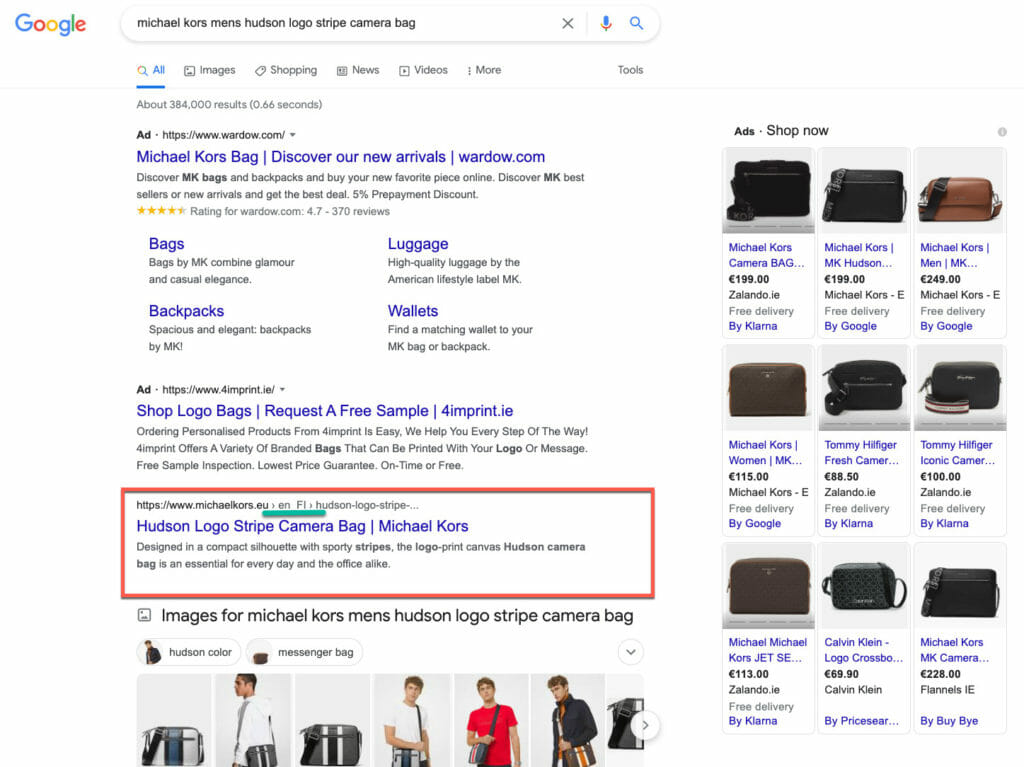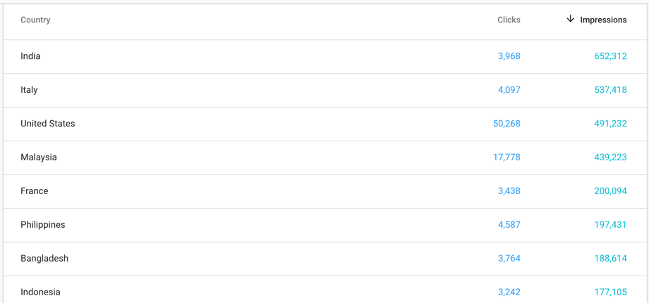
IP Detection and HrefLang
September 13, 2022Why Google Needs to Support hreflang
September 28, 2022Understanding Cross-Market SERP Cannibalization
Some Marketers are happy to have any page ranking well in the search results and often do not consider the negative implications when non-market sites rank higher than the local market in the SERPS. We call this Cross-Market SERP Cannibalization. SERP cannibalization occurs when a market-specific page ranks or outranks another market’s webpage in the local market search engine results. For example, when as a searcher in London is presented a US webpage in the SERPS despite the availability of a UK market webpage from the same company.
“We get very little sales from our local market sites despite ranking very well and spending a fortune on SEO.”
Cross-market cannibalization creates a couple of problems. The most obvious is that when users click on the non-market site, the local market will lose traffic and revenue, negatively impacting their performance reporting. The second, often lesser known problem, is local search users not clicking on the listing because the site ranking is not the local version.
At some point, this problem will be escalated, and typically by the market that is losing traffic and sales to SERP Cannibalization. When all the dust settles from the many meetings and discussions, everyone accepts that it is a bad customer experience. A loss of traffic and revenue to the market is unacceptable, and a solution is required. The discovery and acceptance of the various forms of cannibalization are often the key drivers for hreflang implementation.
Cross-Market Rank Cannibalization
Cross-Market Rank Cannibalization occurs when another market’s website ranks or outranks the local market website. . This happens when the search engine presents, what it believes to be, the best page for the searcher’s query and intent. As stated in the intro, many SEO’s are happy to have any page rank but there are very tangible consequences of the wrong page ranking.

Non-Local Search Results Click Abandonment
Non-Local Search Results Click Abandonment describes those searchers who don’t click on any brand site resulting in an overall loss of clicks to the brand. This is a potentially larger problem and even harder to quantify the impact. Without specific testing, we may not know how the searcher may react to seeing a non-market website in the search results. Unlike traffic cannibalization, this problem relates to those who don’t click on any brand site resulting in an overall loss of clicks to the brand and not just the local market.
From our research and experience working with clients, this challenge is especially problematic in Latin America. Too many companies simply clone one of their Spanish language sites and roll it out for multiple markets with nothing to differentiate it other than a reference to the country in the HTML title tag. In one test specific to Peru, where the Argentina website dominated nearly all search queries, there were few clicks on the SERPs despite the searches containing the brand name. The brand deployed hreflang, and once the Peru site replaced Argentina, the clicks increased nearly 200% in the first month. The noticeable change in the SERPS was the title showing Peru rather than Argentina.

This screen capture of the country report from GSC for the global URL of a company’s top-selling product further indicates the problem of both rank and traffic cannibalization. The page does not have a price or any way to buy it since it is designed to show in markets without a website. This page, in a single month, was shown 3.2 million times in markets that DO have a market page for this product. The HTML Title for this page is Product Name – Global, which is why 99.9% of searchers in India did NOT click on the SERP listing despite this being the exact product they wanted.
Cross-Market Traffic Cannibalization
Cross-Market Traffic cannibalization, also referred to as “Opportunity Cannibalization,” is the negative outcome of rank cannibalization. Cross-Market Traffic cannibalization occurs when another market’s website receives the clicks from organic searches that should have gone to the actual market site.
Commonly, a US webpage may outrank a UK page from the same company. For example, if a UK searcher searches for “stop smoking gum” which is in English may result in Google showing the US website in the results to the searcher in the United Kingdom despite having a UK website.
The query used is both language and location independent but established intent that the search wants information about gum that helps them stop smoking. The challenge is Google will often present the most authoritative of the various brand-family websites, especially when the local brand site is not using a ccTLD and/or is not as authoritative or established.
There are several reasons ranging from the non-local page being more contextually relevant, authoritative, or written in a way that better answers the question. The webpage may lack local signals that help determine the market. A webpage on a dot-com in a folder is less likely to be understood than one on a ccTLD. The page may have a common currency symbol and not have any other reference to the market. Worst case, the page may not be in the index as the search engines assumed it was a duplicate of another page and removed or demoted the page in the index.
Traffic Cannibalization Increases Cart Abandonment
Reducing shopping cart abandonment is one of the primary goals of the eCommerce team. Cart abandonment can happen when a searcher is looking for a specific product and finds it in the search results, clicks the link, is taken to the page, adds the product to their cart, and starts the checkout process. As they go through the process, a nice banner appears that they don’t ship to your market, or the price is odd or significantly more. This is often due to them landing on the incorrect market version.
Most shopping cart abandonment studies often indicate 87% of the time, price and shipping costs are the reason for not purchasing. A number of our customers have taken this a step further and looked at the IP of the searcher and found it is nearly 100% of the time, they are from another market, and even more frustrating, there was a local market site. One Asia Pacific client found the cost of abandonment from non-market shoppers was over 4 million Australian dollars each month. Their initial reaction was to implement IP detection, which ultimately blocked Google from indexing all APAC markets, costing them millions more.
Why do Search Engines allow Cross-Market Cannibalization?
Many marketers get frustrated and rant about how bad it is that Google allows this to happen. As noted above, if the market manager cannot identify unique market signals, how is a search engine able to do it? There are several reasons why it happens,
- The non-local page is more contextually relevant, authoritative, or written in a way that better answers the question.
- The webpage may lack local signals that help determine the market.
- A webpage on a dot-com in a folder is less likely to be understood than one on a ccTLD.
- The page may have a common currency symbol and not reference the market.
- Worst case, the page may not be in the index as the search engines assumed it was a duplicate version of another page and removed or demoted the page.
How can hreflang Minimize Cannibalization?
The easy answer is using hreflang, when used correctly, removes any ambiguity related to the market of the page. It explicitly tells the search engine the target intent of the page. This eliminates the chance that the page will be seen as a duplicate. This tells Google the market when it cannot determine it from the lack of on-page signals. It is especially valuable for a dot-com domain with subdomains or folders indicating the markets by defining them as market-specific when Google cannot decipher your cryptic mix of folders. it adds clarity. This clarity enables Google to present this version in the search results where appropriate. That example of quitting smoking gum, despite being a less relevant page, because hreflang designates it for the UK English searcher Google can show it in the SERPS.
Most of all, remember Google’s goal is to present the most relevant result to the user despite what you want to present. Is it Google’s job to understand your family of websites and present them as you wish? If you believe it is, meet them halfway and do your part by telling them through hreflang tags. If you have any form of cannibalization mentioned above, Hreflang Builder can help you recapture that lost opportunity. We estimate we have recovered over a billion dollars in cross-market sales that had been previously lost. To get started, you can book a consult or demo with the Hreflang Builder Team or signup to start your hreflang project.
